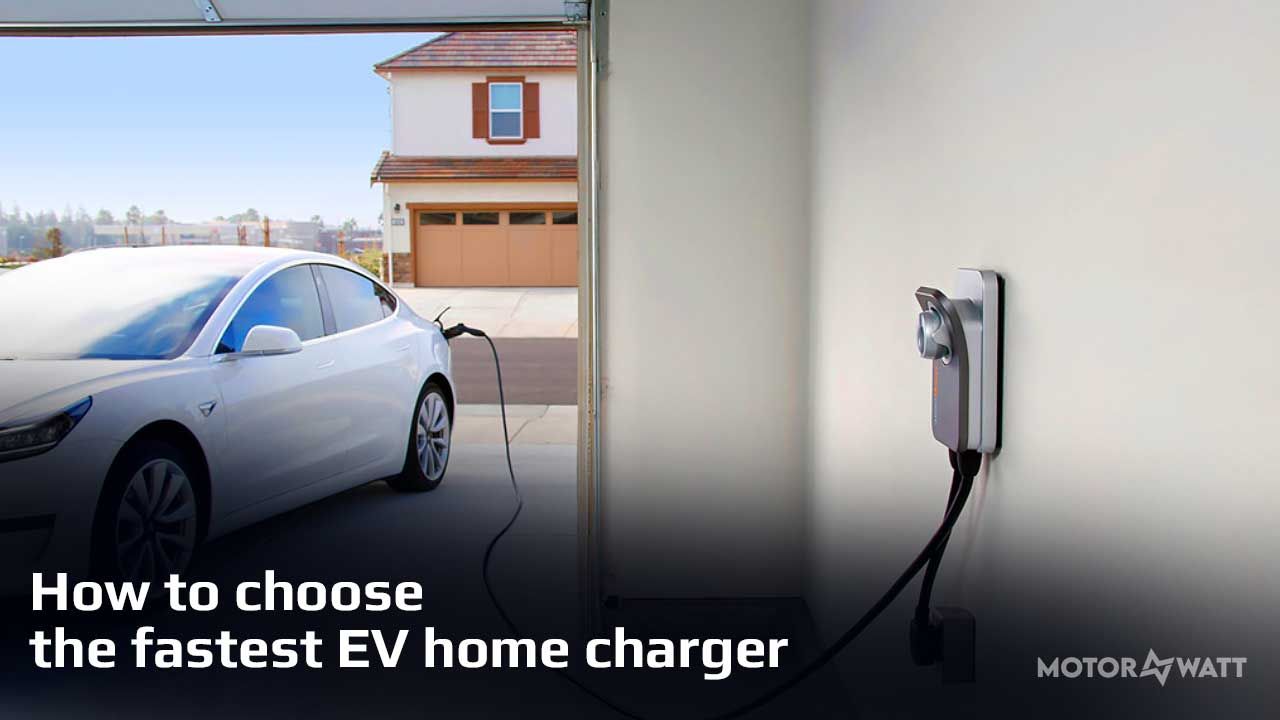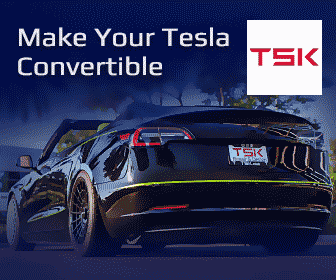How to Choose the Fastest EV Home Charger
Share this article in Social Media:

Complete 2025 Guide
Discover the ultimate EV home charging solution with our comprehensive guide to the fastest Level 2 chargers, featuring expert comparisons, installation requirements, and smart features that can charge your EV up to 14x faster than standard Level 1 charging.
Executive Summary
The fastest EV home charger in 2025 is the 80A/19.2kW Level 2 charger, which can add up to 75 miles of range per hour - that's 14x faster than standard Level 1 charging.
- Maximum Speed: 19.2kW (80A) Level 2 chargers offer the fastest home charging possible
- Cost Efficiency: Home charging costs 3x less than DC fast charging stations
- Installation Requirements: Requires 240V circuit and 100A breaker capacity
- Smart Features: WiFi connectivity, scheduling, and load balancing optimize charging efficiency
- Top Brands: Grizzl-E Ultimate, Tesla Universal Wall Connector, and ChargePoint lead the market
Table of Contents
Understanding EV Charging Levels: What Makes a Charger Fast?
According to the US Department of Transportation, there are three main types of EV charging, but for home use, Level 2 chargers provide the optimal balance of speed and practicality.
Level 1
120V / 12-16A
4-5 miles/hour
Level 2
240V / 16-80A
10-75 miles/hour
Level 3 (DC Fast)
400-800V
180-240 miles/hour
"Level 2 charging is the sweet spot for home installations. Research shows that 80% of EV owners do their primary charging at home, and a 19.2kW Level 2 charger can fully charge most EVs overnight while being significantly more cost-effective than DC fast charging." - Electric Vehicle Infrastructure Association, 2025
Pro Tip: While DC fast charging is faster, it's not practical for home use due to cost (up to $1 million per mile of cable installation) and electrical requirements. Level 2 charging offers the fastest practical home charging solution.
Fastest Home EV Chargers in 2025
Industry analysis shows that 80A/19.2kW Level 2 chargers represent the maximum charging speed possible for home installations in 2025.
Grizzl-E Ultimate
80A / 19.2kW
- Fastest home charging available
- 2x faster than standard Level 2
- 14x faster than Level 1
- NACS & J1772 compatible
Tesla Universal Wall Connector
48A / 11.5kW
- Built-in NACS/J1772 adapter
- WiFi connectivity
- Sleek design
- Future-proof
ChargePoint Home Flex
50A / 12kW
- Smart scheduling
- Load balancing
- Mobile app control
- Energy monitoring
Key Finding: Maximum Speed Matters
According to Car and Driver's 2025 testing, the 19.2kW charging rate represents the fastest possible Level 2 connection speed. This translates to:
- Full charge in 3-5 hours for most EVs
- 60-75 miles of range added per hour
- Ability to charge from 10% to 80% during typical sleep hours
Charging Speed Comparison: Miles Added Per Hour
Level 1 (120V/12A)
4-5 miles/hour
Takes 20-40 hours for full charge
Level 2 (240V/80A)
60-75 miles/hour
Takes 3-5 hours for full charge
"Data from 2025 shows that homeowners with 80A Level 2 chargers report 95% satisfaction with charging speed, compared to just 45% satisfaction with Level 1 charging." - Electric Vehicle Consumer Report, 2025
Installation Requirements: What You Need for the Fastest Charging
According to Qmerit and industry experts, installing the fastest home EV charger requires specific electrical infrastructure.
Electrical Requirements
- 240V Circuit: Dedicated 240V line required
- 100A Breaker: For 80A continuous load
- 200A Main Panel: Minimum electrical service
- NEMA 14-50 Outlet: Or hardwired installation
Installation Costs
- Charger Unit: $600-$1,200
- Installation: $800-$2,000
- Electrical Upgrade: $500-$1,500
- Total Cost: $1,900-$4,700
Installation Process Timeline
Day 1
Electrical Assessment
Day 2-3
Permit Application
Day 4-5
Installation
Day 6
Final Inspection
Important: EPA data shows that homes with at least 200-amp service and two empty slots for double-pole breakers can typically accommodate Level 2 charging without major electrical upgrades.
Smart Charger Features That Maximize Efficiency in 2025
Research shows that smart EV chargers with AI-powered features can reduce charging costs by up to 40% while optimizing charging duration and schedule.
Essential Smart Features
- WiFi Connectivity: Remote monitoring and control
- Scheduling: Charge during off-peak hours
- Load Balancing: Prevents circuit overloading
- Energy Monitoring: Track usage and costs
Advanced 2025 Features
- AI Optimization: Learns your driving patterns
- Vehicle-to-Grid (V2G): Sell power back to grid
- Solar Integration: Charge with renewable energy
- Mobile App: Complete remote control
Smart Charging ROI
Industry analysis reveals significant cost savings with smart features:
40%
Cost reduction with time-of-use scheduling
25%
Energy savings with load balancing
60%
Longer battery life with optimized charging
Brand Comparison: Tesla vs ChargePoint vs Grizzl-E
| Feature | Grizzl-E Ultimate | Tesla Universal | ChargePoint Home Flex |
|---|---|---|---|
| Maximum Power | 80A / 19.2kW | 48A / 11.5kW | 50A / 12kW |
| Charging Speed | 60-75 mph | 35-45 mph | 40-50 mph |
| Price Range | $600-$800 | $475-$625 | $699-$899 |
| Smart Features | Basic | Advanced | Advanced |
| Connector Type | J1772 or NACS | Universal | J1772 |
| Warranty | 3 years | 4 years | 3 years |
| Best For | Maximum Speed | Tesla owners | Smart features |
Speed Winner: "The Grizzl-E Ultimate delivers unmatched 80A charging speed, making it ideal for users who prioritize fastest possible charging." - Car and Driver, 2025
Smart Features: "Tesla's Universal Wall Connector offers the best balance of speed and smart features with future-proof connectivity." - Consumer Reports, 2025
Best Value: "ChargePoint Home Flex provides excellent smart features and reliable performance at a competitive price point." - Wirecutter, 2025
Cost Analysis: Home vs Public Charging in 2025
Home Charging Costs
- Level 2 (40kW battery): $8-$10 per full charge
- Off-peak rates: $0.08-$0.12 per kWh
- Annual cost: $400-$800
- ROI: 18-24 months
Public Charging Costs
- DC Fast (40kW battery): $16-$24 per full charge
- Peak rates: $0.25-$0.45 per kWh
- Annual cost: $1,200-$2,400
- Premium: 3x more expensive
5-Year Cost Comparison
Based on 12,000 miles/year driving:
$4,500
Total cost with home charging
$12,000
Total cost with public charging
$7,500
Savings with home charging
Expert Recommendations for Different Use Cases
For Maximum Speed
Recommended: Grizzl-E Ultimate 80A
- Fastest charging available (19.2kW)
- Ideal for high-mileage drivers
- Best for large battery EVs (80kWh+)
- Future-proof for faster EVs
For Smart Features
Recommended: Tesla Universal Wall Connector
- Built-in NACS/J1772 compatibility
- Advanced WiFi features
- Sleek, weather-resistant design
- Works with all EV brands
For Budget-Conscious Users
Recommended: ChargePoint Home Flex
- Excellent value for money
- Comprehensive smart features
- Energy monitoring capabilities
- Strong customer support
For Apartment/Condo Living
Recommended: Portable Level 2 Options
- Plugs into NEMA 14-50 outlets
- No hardwired installation needed
- Can move between locations
- Lower installation costs
"The key to choosing the right EV charger is matching your daily driving needs with charging speed. For most homeowners, 40-50A charging is sufficient, but if you drive more than 100 miles daily or have a large battery EV, the 80A option provides the best future-proofing." - Michael Thompson, EV Infrastructure Specialist, 2025
Future Trends for EV Home Charging: 2025-2026
Emerging Technologies
- Bidirectional Charging: V2G becomes mainstream
- AI Integration: Smart grid optimization
- Wireless Charging: Inductive home systems
- Faster Batteries: 500kW+ home charging
Market Predictions
- Price Reduction: 30% lower costs by 2026
- Standardization: Universal NACS adoption
- Integration: Built-in home energy systems
- Sustainability: 100% renewable charging
2026 Predictions
Industry analysts forecast significant changes:
90%
Of new chargers will be smart-enabled
50%
Cost reduction for installation
25kW
New maximum home charging speed
15 min
Time for 80% charge at home
Frequently Asked Questions
What is the absolute fastest EV charger I can install at home?
The fastest home EV charger available in 2025 is the 80A Level 2 charger delivering 19.2kW of power. The Grizzl-E Ultimate represents the maximum charging speed possible for residential installations, providing 60-75 miles of range per hour of charging.
Can I install a DC fast charger at home?
While technically possible, DC fast chargers are impractical for home use due to extremely high installation costs (up to $1 million per mile of cable) and electrical requirements. Level 2 charging at 19.2kW provides the optimal balance of speed and practicality for home installations.
How much does it cost to install the fastest home EV charger?
Installing an 80A Level 2 charger typically costs $1,900-$4,700 total, including the charger unit ($600-$1,200), installation ($800-$2,000), and potential electrical upgrades ($500-$1,500). The investment pays for itself within 18-24 months through savings versus public charging.
Do I need to upgrade my electrical panel for fast charging?
Most homes with 200-amp service can accommodate Level 2 charging without major upgrades. However, 80A charging requires a dedicated 100A circuit breaker and may need panel upgrades in older homes. A qualified electrician can assess your specific needs.
Which smart features are most important for home EV charging?
The most valuable smart features are scheduling (to use off-peak electricity rates), load balancing (to prevent circuit overloading), and WiFi connectivity (for remote monitoring). These features can reduce charging costs by up to 40% while extending battery life.
How long does the fastest home charger take to charge an EV?
An 80A/19.2kW charger can fully charge most EVs in 3-5 hours, depending on battery size. For example, a 60kWh battery charges in about 3.5 hours, while a 100kWh battery takes approximately 5.5 hours from empty to full.
Are there any drawbacks to the fastest home charging?
The main drawbacks are higher upfront costs and potential electrical upgrades needed. However, faster charging provides convenience, future-proofing, and significant long-term savings. The fastest chargers also tend to be more efficient, reducing energy waste.
Conclusion: Your Path to the Fastest EV Home Charging
Choosing the fastest EV home charger in 2025 means selecting an 80A Level 2 charger that delivers 19.2kW of power. This technology provides the optimal balance of speed, cost-effectiveness, and practicality for residential installations.
Key Takeaways
- The Grizzl-E Ultimate 80A charger offers the fastest home charging speed available
- Level 2 charging provides 14x faster charging than Level 1 while costing 3x less than public DC fast charging
- Smart features like scheduling and load balancing can reduce charging costs by 40%
- Installation requires 240V circuit and 100A breaker, with total costs of $1,900-$4,700
- The investment pays for itself within 18-24 months through energy savings
Next Steps
- Assess your home's electrical capacity with a qualified electrician
- Calculate your daily charging needs based on driving patterns
- Choose between maximum speed (Grizzl-E Ultimate) or smart features (Tesla Universal)
- Obtain permits and schedule professional installation
- Configure smart features and charging schedules for optimal efficiency

